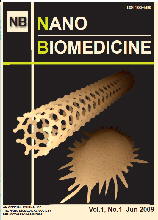
Nano Biomedicine
ORIGINAL ARTICLE
Zinc Deficiency Modulates Slow Inward Rectification in Neonatal Rat Mesencephalic V Neurons
Susumu TANAKA, Saori YAMADA, and Mikihiko KOGO
The 1st Department of Oral and Maxillofacial Surgery,
Graduate School of Dentistry, Osaka University, Osaka, Japan
Nano Biomed 2020; 12(2):61-68, (Dec 30, Nano Biomedicine)
Synopsis
Background: Inward rectification is a common membrane property that controls subthreshold and firing behavior such as resonance, repetitive firing and intrinsic bursting activities in mesencephalic trigeminal (Mes V) neurons, which regulate oral-motor activities. Endogenously released neuro-transmitters and extracellular ionic environment and homeostasis modulate the fast (IKIR) and slow (Ih) inward rectifying currents underlying this membrane property. The present study evaluates the influence of zinc deficiency, which causes alteration in feeding behavioral characteristics, on this membrane property including IKIR and Ih in neonatal rat Mes V neurons.
Methods: Sprague?Dawley rats (postnatal days 10?12) were fed either a normal diet (CT) or a zinc-deficient diet (ZD). Whole-cell patch-clamp recordings were obtained from Mes V neurons in coronal brain slices and inward currents in response to hyperpolarizing voltage steps were recorded under modified ACSF solution to specifically isolate IKIR and Ih.
Results: Depolarizing voltage sag in response to hyperpolarizing current pulses were suppressed in the ZD group under current-clamp recording. Also, there were no differences in amplitude and current density of IKIR between the two groups, while the current density in Ih of the ZD group was substantially lower under voltage-clamp recording. The activation curve for Ih including half-maximal activation voltage was shifted to more hyperpolarized potential and both fast and slow time constants for Ih activation were higher in the ZD group than those in the CT group.
Conclusions: Zinc deprivation modulates slow inward rectifying current, Ih by decreasing the maximum conductance and shifting the gating properties of activation in Mes V neurons.
Key words: zinc deficiency, mesencephalic trigeminal neuron, patch clamp, sensory neurons
All documents in this paper (Free)
J-Stage https://www.jstage.jst.go.jp/article/nano/12/2/12_61/_article
DOI https://doi.org/10.11344/nano.12.61
Background: Inward rectification is a common membrane property that controls subthreshold and firing behavior such as resonance, repetitive firing and intrinsic bursting activities in mesencephalic trigeminal (Mes V) neurons, which regulate oral-motor activities. Endogenously released neuro-transmitters and extracellular ionic environment and homeostasis modulate the fast (IKIR) and slow (Ih) inward rectifying currents underlying this membrane property. The present study evaluates the influence of zinc deficiency, which causes alteration in feeding behavioral characteristics, on this membrane property including IKIR and Ih in neonatal rat Mes V neurons.
Methods: Sprague?Dawley rats (postnatal days 10?12) were fed either a normal diet (CT) or a zinc-deficient diet (ZD). Whole-cell patch-clamp recordings were obtained from Mes V neurons in coronal brain slices and inward currents in response to hyperpolarizing voltage steps were recorded under modified ACSF solution to specifically isolate IKIR and Ih.
Results: Depolarizing voltage sag in response to hyperpolarizing current pulses were suppressed in the ZD group under current-clamp recording. Also, there were no differences in amplitude and current density of IKIR between the two groups, while the current density in Ih of the ZD group was substantially lower under voltage-clamp recording. The activation curve for Ih including half-maximal activation voltage was shifted to more hyperpolarized potential and both fast and slow time constants for Ih activation were higher in the ZD group than those in the CT group.
Conclusions: Zinc deprivation modulates slow inward rectifying current, Ih by decreasing the maximum conductance and shifting the gating properties of activation in Mes V neurons.
Key words: zinc deficiency, mesencephalic trigeminal neuron, patch clamp, sensory neurons
All documents in this paper (Free)
J-Stage https://www.jstage.jst.go.jp/article/nano/12/2/12_61/_article
DOI https://doi.org/10.11344/nano.12.61